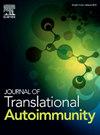A placebo-controlled Phase 2 trial of E6011, anti-human fractalkine monoclonal antibody, in primary biliary cholangitis
IF 3.6
Q2 IMMUNOLOGY
引用次数: 0
Abstract
Background
While ursodeoxycholic acid (UDCA) remains the first-line therapy for primary biliary cholangitis (PBC), the autoimmune nature of PBC underscores the need for treatments targeting immunological pathways that may achieve a cure. E6011, a novel humanized anti-fractalkine monoclonal antibody, has emerged as a potential therapeutic option for PBC. We conducted a randomized, placebo-controlled, double-blind study to evaluate the efficacy and safety of E6011 in patients with PBC with an incomplete response to UDCA.
Methods
The study was composed of 12-week Double-Blind Phase (placebo, E6011 10 mg/kg/month, 15 mg/kg/month, or 10 mg/kg/every other week [eow]) followed by a 52-week Open-Label Phase. The primary endpoint was the percent change in alkaline phosphatase (ALP) at Week 12.
Results
A total of 29 patients were enrolled. Histological evaluation at screening revealed that 83 % of the enrolled patients were classified as Stage 4 according to the Nakanuma Classification. The mean percent changes in ALP at Week 12 were +0.45 % in the placebo, +0.65 % in the 10 mg/kg/month, +1.23 % in the 15 mg/kg/month and +1.19 % in the 10 mg/kg/eow, with no observed trends toward ALP reduction in the E6011 treatment. Based on the interim analysis, the study was discontinued due to a lack of the efficacy. E6011 was generally safe and well tolerated.
Conclusion
This study of E6011 failed to meet the primary endpoint in patients with PBC with an incomplete response to UDCA. The advanced histological severity present in more than 80 % of patients at baseline may have contributed to these findings.
抗人fractalkine单克隆抗体E6011治疗原发性胆管炎的安慰剂对照2期试验
背景尽管熊去氧胆酸(UDCA)仍是治疗原发性胆汁性胆管炎(PBC)的一线疗法,但 PBC 的自身免疫性质突出表明,需要针对免疫途径的治疗方法来实现治愈。E6011是一种新型人源化抗小动脉粥样硬化单克隆抗体,已成为PBC的潜在治疗方案。我们进行了一项随机、安慰剂对照、双盲研究,以评估 E6011 在对 UDCA 反应不完全的 PBC 患者中的疗效和安全性。主要终点是第12周时碱性磷酸酶(ALP)的变化百分比。筛查时的组织学评估显示,根据中沼分类法,83%的入组患者被划分为4期。第12周时,安慰剂的ALP平均变化率为+0.45%,10 mg/kg/月为+0.65%,15 mg/kg/月为+1.23%,10 mg/kg/ow为+1.19%,E6011治疗未观察到ALP下降趋势。根据中期分析,该研究因缺乏疗效而终止。E6011总体上安全且耐受性良好。结论这项E6011研究未能在对UDCA反应不完全的PBC患者中达到主要终点。80%以上的患者在基线时组织学严重程度已达到晚期,这可能是导致上述结果的原因之一。
本文章由计算机程序翻译,如有差异,请以英文原文为准。
求助全文
约1分钟内获得全文
求助全文
来源期刊

Journal of Translational Autoimmunity
Medicine-Immunology and Allergy
CiteScore
7.80
自引率
2.60%
发文量
33
审稿时长
55 days
 求助内容:
求助内容: 应助结果提醒方式:
应助结果提醒方式:


